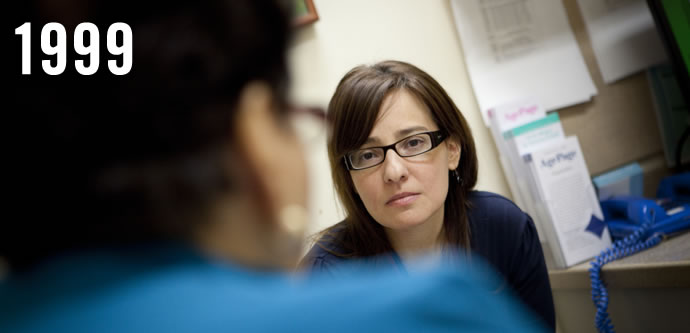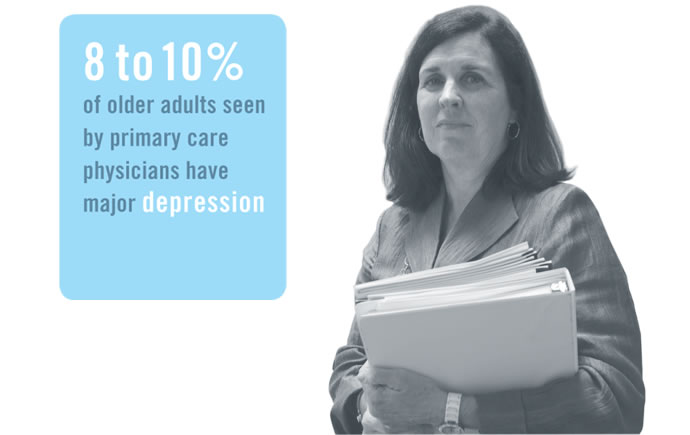INNOVATIVE MODELS OF CARE

Improving Treatment for Late-Life Depression
1999-present The Hartford Foundation recognized that in order to adequately meet the health care needs of older adults it was necessary to address mental as well as physical health. Even though effective treatments are available for depression, it often goes undiagnosed and untreated in older adults. Jürgen Unützer, MD, MPH, then at the University of California, Los Angeles, led a multisite trial to more effectively treat late-life depression in primary care settings, where older adults typically receive mental health care.
The Hartford Foundation provided $8 million for a clinical trial to test the multidisciplinary collaborative model called IMPACT (Improving Mood – Promoting Access to Collaborative Treatment for Late-Life Depression). Co-funding of $3 million was obtained from the California HealthCare, Hogg, and Robert Wood Johnson Foundations.
The study showed that the IMPACT team care approach is twice as effective as usual treatment for depression for older adults and it reduces total health care costs (IMPACT).
A $2.4 million follow-up grant in 2004 was used to establish an implementation center, which has become self-sustaining. In 2012, the Foundation and the implementation center competed for a grant from the federal Corporation for National and Community Service through its Social Innovation Fund to scale and spread an evidence-based practice.
The IMPACT model has been implemented in over 600 health care practices in more than 30 states. In 2008, Minnesota began implementation of the IMPACT model and by 2012, 30 percent of the 8,000 patients treated for major depression in the 70 participating clinics were in remission, six times higher than the state average for all clinics. Several large health plans have incorporated core components of IMPACT into their care delivery, and underserved populations in the rural northwest will benefit thanks to the Social Innovation Fund award.
“This is an example of how foundation money can not only change something in health care but create something that sustains itself over the long run.” Jürgen Unützer, MD, MPHProfessor and Vice Chair
Department of Psychiatry and Behavioral Sciences
University of Washington
 (Above) Depression Care Manager Marcia Honigsztejn, LCSW, of the Woodhull Medical Center, Brooklyn, NY, with a patient referred to her by her primary care doctor after the death of her mother.
(Above) Depression Care Manager Marcia Honigsztejn, LCSW, of the Woodhull Medical Center, Brooklyn, NY, with a patient referred to her by her primary care doctor after the death of her mother.
 (Above) Rita Haverkamp, RN, MSN, CNS, a Depression Care Manager at Kaiser Permanente, San Diego, CA, who was involved in the original IMPACT trial, sees a patient at Kaiser Permanente, San Diego, CA whose medication for depression has failed (below).
(Above) Rita Haverkamp, RN, MSN, CNS, a Depression Care Manager at Kaiser Permanente, San Diego, CA, who was involved in the original IMPACT trial, sees a patient at Kaiser Permanente, San Diego, CA whose medication for depression has failed (below).
 “Baby boomers have higher risks for depression, anxiety and substance abuse disorders than people born before World War II.”
Dilip V. Jeste, MD
“Baby boomers have higher risks for depression, anxiety and substance abuse disorders than people born before World War II.”
Dilip V. Jeste, MD
Director
Hartford Center of Excellence in Geriatric Psychiatry
Estelle and Edgar Levi Chair in Aging
University of California, San Diego
 Rita Haverkamp (above, left ) and Dr. Jürgen Unützer (above, right) lead a training session on implementing the IMPACT model for the Los Angeles County Department of Mental Health.
Rita Haverkamp (above, left ) and Dr. Jürgen Unützer (above, right) lead a training session on implementing the IMPACT model for the Los Angeles County Department of Mental Health.
Project IMPACT: Improving Mood – Promoting Access to Collaborative Treatment for Late-Life Depression 2011 videos.